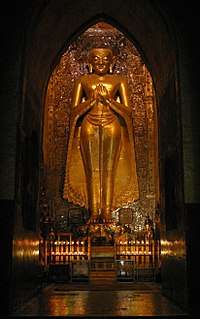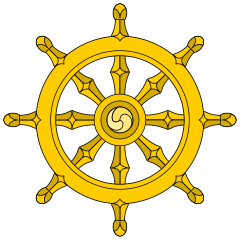Kakusandha Buddha
Kakusandha Buddha (Pāli), known as Krakucchaṃda in Sanskrit, is one of the ancient Buddhas whose biography is chronicled in chapter 22[1] of the Buddhavamsa, one of the books of the Pāli Canon.
| Kakusandha | |
|---|---|
 Ananda Temple Buddha | |
| Sanskrit | क्रकुच्छंद |
| Pāli | Kakusandha |
| Burmese | ကကုသန် ([ka̰kṵθàɰ̃]) |
| Chinese | 拘留孙佛 (Pinyin: Jūliúsūn Fó) |
| Japanese | (romaji: Kuruson Butsu) |
| Khmer | ព្រះពុទ្ធកកុសន្ធោ Preah Puth Kakosantho |
| Korean | 구류손불 (RR: Guryuson Bul) |
| Mongolian | Кракучандра |
| Sinhala | කකුසඳ බුදුන් වහන්සේ Kakusandha budun wahanse |
| Thai | พระกกุสันธพุทธเจ้า Phra Kakusantha Phutthachao |
| Tibetan | འཁོར་བ་འཇིག་ Wylie: 'khor ba 'jig THL: khorwa jik |
| Vietnamese | Phật Câu Lưu Tôn |
| Information | |
| Venerated by | Theravada, Mahayana, Vajrayana |
| Part of a series on |
| Buddhism |
|---|
 |
|
|
|
According to Theravāda Buddhist tradition, Kakusandha is the twenty-fifth of the twenty-nine named Buddhas, the fourth of the Seven Buddhas of Antiquity, and the first of the five Buddhas of the present kalpa.[2]
The present kalpa is called the bhadrakalpa (Auspicious aeon). The five Buddhas of the present kalpa are:[3][4]
- Kakusandha (the first Buddha of the bhadrakalpa)
- Koṇāgamana (the second Buddha of the bhadrakalpa)
- Kassapa (the third Buddha of the bhadrakalpa)
- Gautama (the fourth and present Buddha of the bhadrakalpa)
- Maitreya (the fifth and future Buddha of the bhadrakalpa)
Life
Kakusandha Buddha was born in Khemavati Park in Khemavati according to the Theravada tradition.[1] Khemavati is now known as Gotihawa, and it is located about 4 kilometres (2.5 mi) southeast of Kapilavastu, in Kapilvastu District, in the Lumbini Zone of southern Nepal.[5] His father was Aggidatta,a chaplain of the king Khemankara of Khemavati. His mother was Visakha. His wife was Virochamana (also known as Rocani); he had a son, Uttara (son of Kakusandha). Asoka visited Gotihawa, Nepal when he visited Lumbini, Nepal and installed a stone pillar and inscribed his visit in the pillar. There is also a stupa in Gothihawa. Therefore, it is generally accepted due to the pillar that stupa is associated with the nirvana of Kakusandha Buddha.
Kakusandha lived for four thousand years in the household in three palaces: Ruci, Suruci and Vaddhana (or Rativaddhana). At the age of four thousand, he renounced the worldly life while riding on a chariot. He practised austerities for eight months.[6] Before attaining enlightenment, he had accepted some milk-rice from the daughter of the Brahmin Vajirindha of the village Suchirindha, as well as grass for his seat from the yavapalaka Subhadda. He attained enlightenment under a sirisa tree, then delivered his first sermon to the assembly of eighty-four thousand monks in a park near Makila.
Kakusandha performed the twin miracle under a sala tree, at the gates of Kannakujja. Among his converts was a fierce yaksha named Naradeva. Kakusandha kept the fast-day (uposatha) every year.
His chief disciples were Vidhura and Sanjiva among the monks, and Sama and Champa among the nuns. His personal attendant was Buddhija. Acchuta and Samana among the men, and Nanda and Sunanda among the women were his chief lay-supporters. Acchuta built a monastery for Kakusandha Buddha on the same site, which was later chosen by Anathapindika for Jetavana Arama for Gautama Buddha.
According to the Samyutta Nikaya (ii.194), the Vepulla peak of Rajgir was then called Pachinvamsa; and the people of the region Tivara.
Kakusandha's body was forty cubits in height, and he died at the age of forty thousand years in Khemavati. The stupa erected over his relics was one league high.[6]
The bodhisattva who was to become Siddhartha Gautama was born as King Khema during the time of Kakusandha. Kakusandha was the Buddha who foretold that King Khema, who offered him alms with robes and medicines, would become the Gautama Buddha in the future.[7]
See also
References
- Vicittasarabivamsa, U (1992). "Chapter 22: Kakusandha Buddhavamsa". In Ko Lay, U; Tin Lwin, U (eds.). The great chronicle of Buddhas, Volume One, Part Two (1st ed.). Yangon, Myanmar: Ti=Ni Publishing Center. pp. 274–80.
- Gärtner, Uta; Jens Lorenz (1994). Tradition and modernity in Myanmar. LIT Verlag. p. 281. ISBN 978-3-8258-2186-9.
- Buswell Jr., RE; Lopez Jr., DS (2014). The Princeton Dictionary of Buddhism (1st ed.). Princeton, New Jersey: Princeton University Press. p. 106. ISBN 978-0-691-15786-3.
- "Chapter 36: The Buddhas in the three periods of time". Buddhism in a Nutshell Archives. Hong Kong: Buddhistdoor International. Retrieved 2014-12-21.
- Chan Khoon San, Buddhist Pilgrimage Archived 2015-03-25 at the Wayback Machine, Subang Jaya Buddhist Association, Subang Jaya, Malaysia, 2001, page 51.
- Vipassana.info, Pali Proper Names Dictionary: Kakusandha
- Prophecies of Kakusandha Buddha, Konagamana Buddha and Kassapa Buddha Archived 2011-07-13 at the Wayback Machine
| Buddhist titles | ||
|---|---|---|
| Preceded by Vessabhū Buddha |
Seven Buddhas of the Past | Succeeded by Koṇāgamana Buddha |